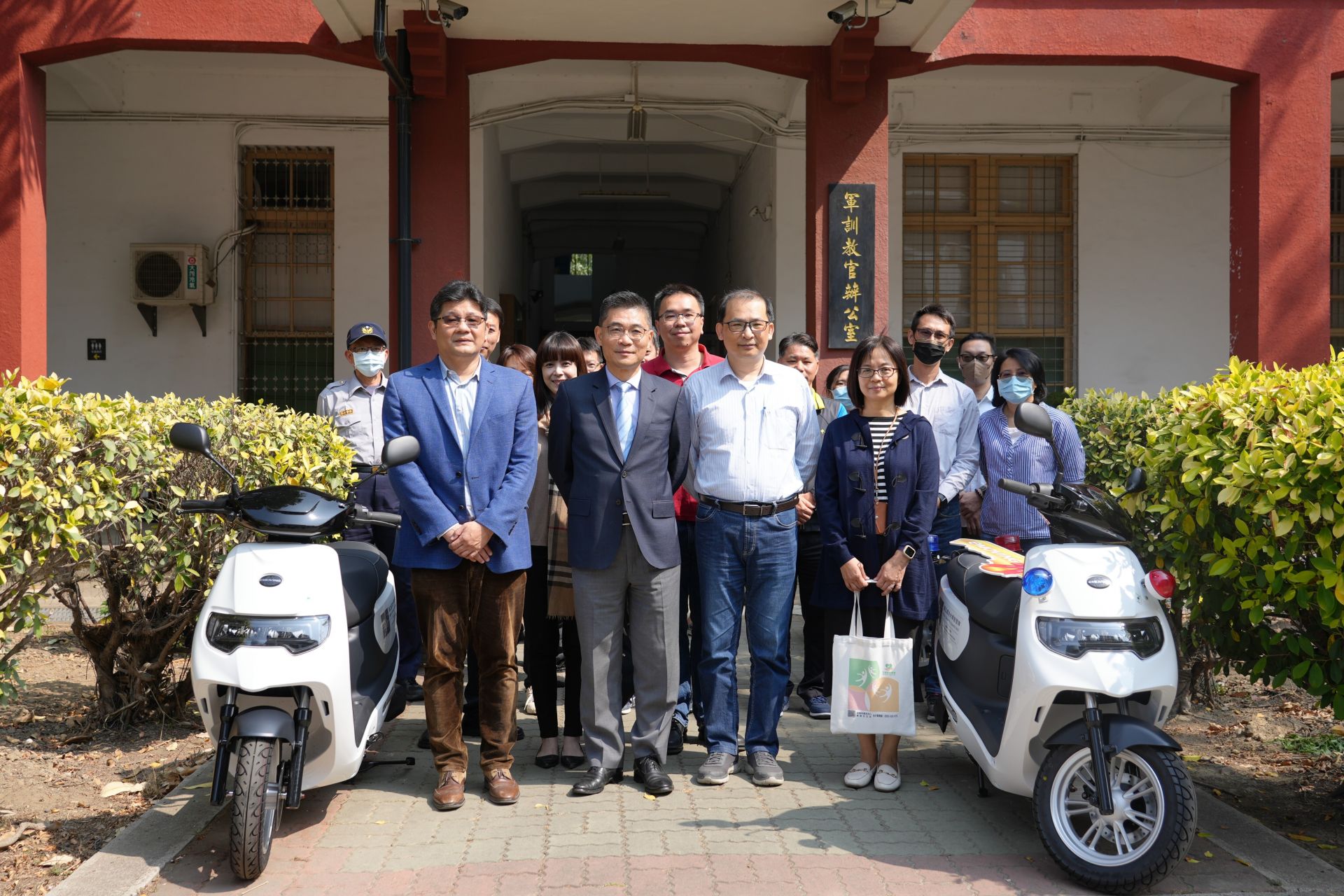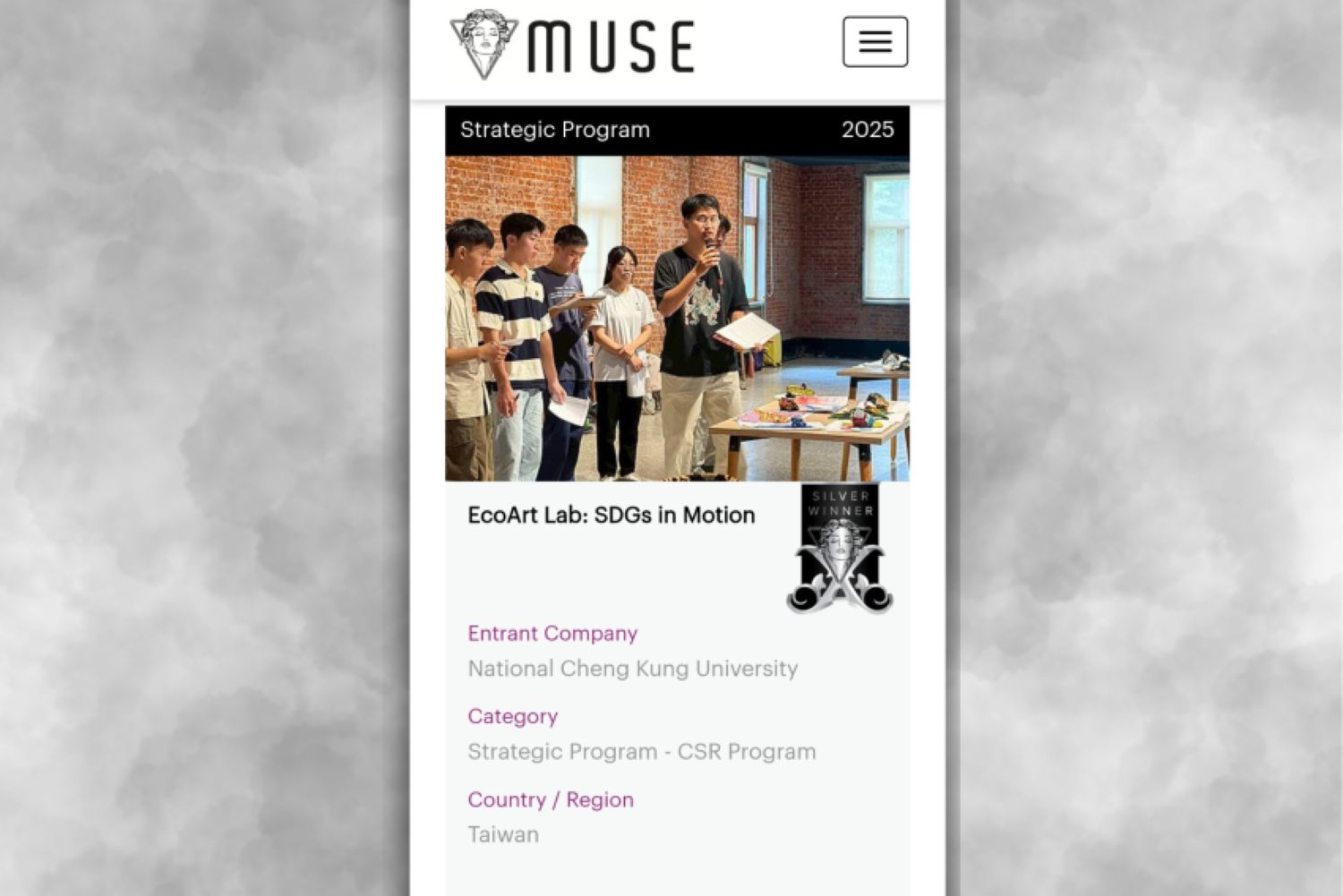SDG13
Chiayi City Partners with NCKU, Combining AI Technology to Achieve Net-Zero Transformation for the Wooden City
For the sake of urban sustainability, achieving net-zero emissions by 2050 and climate adaptation have become the top priorities for every city. In the past, surveys of carbon sequestration in plants were conducted tree-by-tree, a process that was time-consuming, labor-intensive, inefficient, and subject to environmental limitations. Starting this year (2024), the Chiayi City Government has partnered with National Cheng Kung University (NCKU) to introduce drone aerial photography technology and attempt to enhance efficiency with innovative AI technologies. Today (16th), Chiayi Mayor Min-Hui Huang and NCKU’s Director of Research and Development, Chuan-Pu Liu, led the project team in holding a press conference at the Chiayi Park Historical Museum titled “AI Technology in Chiayi: Advancing Net-Zero Transformation for the Wooden City.” They announced the results of their surveys on “urban green space carbon sequestration” and “carbon storage in wooden structures,” aiming to advance Chiayi City's net-zero efforts through the development of new technologies.
“Every summer from now on will be the coolest summer of your life,” Mayor Min-Hui Huang quoted NCKU Distinguished Professor of Architecture Tzu-Ping Lin, expressing concern over the escalating trend of climate change and extreme heat. Chiayi City's vision is “Intergenerational Living for All Ages,” and it has incorporated the concept of “New Sustainability” into city governance. This year, the city enacted the “Chiayi City Net-Zero Emissions and Sustainable Management Self-Government Ordinance,” becoming the first non-metro city to officially enshrine the 2050 net-zero emissions target into local law, providing a legal basis for net-zero governance and strengthening management effectiveness.
Mayor Huang expressed her delight at collaborating with NCKU this year to integrate mature AI technology and drone aerial photography to improve the efficiency of carbon sequestration surveys, expediting the monitoring of carbon sequestration in urban green spaces and wooden buildings. She emphasized Chiayi’s commitment and responsibility to achieving net-zero emissions, saying, "We owe it to the next generation to leave behind a city worth looking forward to." Although Chiayi is a small city and easily overlooked, it is implementing “big innovations in a small city” by leveraging the power of education to make a difference.
Mayor Huang noted that Chiayi has two forests: one is the famous Alishan, and the other is the 6,000+ wooden buildings within Chiayi City. By making modern timber structures the core of the “Wood City 3.0 Plan,” the city is promoting new construction methods and materials for wooden buildings, offering a new architectural choice. The city aims to harness the carbon sequestration potential of these 6,000 wooden houses, along with urban parks, street trees, and green school grounds, to meet the dual goals of “zero carbon emissions” and “carbon storage” in the face of the net-zero challenge. Looking ahead, the city hopes that through government-academic-research collaboration, more industries will join in the journey toward a new era of sustainability.
Professor Chih-Da Wu from NCKU’s Department of Geomatics and Spatial Information Science pointed out that Chiayi City boasts rich “green space resources” and “wooden cultural heritage,” both with significant potential for carbon sequestration. The NCKU project team, drawing on their experience from campus carbon sequestration surveys, has already experimented with combining drone-based multispectral aerial photography with AI algorithms, as well as integrating Building Information Modeling (BIM) and other innovative methods. However, this is the first time these technologies have been applied in an urban survey. To expand the application of these technologies, Professor Wu chose his hometown, Chiayi City, as the research site, focusing on three main types of urban green spaces (urban parks, school green spaces, and street trees) and Chiayi’s wooden buildings to assess carbon storage. Chiayi thus became the first city in Taiwan to apply Geo-AI in carbon sequestration surveys.
This year, the project launched investigations and estimates for green spaces such as parks, school green areas, and street trees, as well as two experimental wooden buildings (South and North buildings). The surveys covered five green space areas and two sites for estimating the carbon sequestration benefits of wooden structures. The green spaces included one urban park (Chiayi Park and Botanical Garden), one street tree area (Section 3 of Shixian Road), and three school green spaces (Chiayi High School, Yushan Junior High School, and Xingjia Elementary School). Altogether, these five urban green spaces provide approximately 36.7 tons of monthly carbon storage for Chiayi, with an annual carbon storage capacity of 440.4 tons. The two experimental wooden buildings (South and North) not only use wood as the primary material but also demonstrate modern timber construction methods and reinforcements. This significantly reduces carbon emissions from the construction industry while simultaneously storing carbon and delaying the release of carbon back into the atmosphere. According to the study, these two wooden buildings provide a carbon sequestration benefit equivalent to 19.85 tons of CO2.
The NCKU project team brought together experts from various fields. Under the invitation of Professor Chih-Da Wu, Assistant Professor Yu-Liang Hsu from the Department of Architecture, Professor Wan-Yu Liu from National Chung Hsing University’s Department of Forestry, and Dr. Ruo-Bin Hong, a researcher from the Agricultural Engineering Research Center, also participated in the project. Their efforts have been recognized with the Gold Award at the 2024 4th Taiwan Sustainable Action Awards. The team hopes that the Geo-AI science methods they’ve introduced will be applicable to various fields in the future and could be used by cities across Taiwan to help the nation achieve its 2050 net-zero carbon emission goal.
“Every summer from now on will be the coolest summer of your life,” Mayor Min-Hui Huang quoted NCKU Distinguished Professor of Architecture Tzu-Ping Lin, expressing concern over the escalating trend of climate change and extreme heat. Chiayi City's vision is “Intergenerational Living for All Ages,” and it has incorporated the concept of “New Sustainability” into city governance. This year, the city enacted the “Chiayi City Net-Zero Emissions and Sustainable Management Self-Government Ordinance,” becoming the first non-metro city to officially enshrine the 2050 net-zero emissions target into local law, providing a legal basis for net-zero governance and strengthening management effectiveness.
Mayor Huang expressed her delight at collaborating with NCKU this year to integrate mature AI technology and drone aerial photography to improve the efficiency of carbon sequestration surveys, expediting the monitoring of carbon sequestration in urban green spaces and wooden buildings. She emphasized Chiayi’s commitment and responsibility to achieving net-zero emissions, saying, "We owe it to the next generation to leave behind a city worth looking forward to." Although Chiayi is a small city and easily overlooked, it is implementing “big innovations in a small city” by leveraging the power of education to make a difference.
Mayor Huang noted that Chiayi has two forests: one is the famous Alishan, and the other is the 6,000+ wooden buildings within Chiayi City. By making modern timber structures the core of the “Wood City 3.0 Plan,” the city is promoting new construction methods and materials for wooden buildings, offering a new architectural choice. The city aims to harness the carbon sequestration potential of these 6,000 wooden houses, along with urban parks, street trees, and green school grounds, to meet the dual goals of “zero carbon emissions” and “carbon storage” in the face of the net-zero challenge. Looking ahead, the city hopes that through government-academic-research collaboration, more industries will join in the journey toward a new era of sustainability.
Professor Chih-Da Wu from NCKU’s Department of Geomatics and Spatial Information Science pointed out that Chiayi City boasts rich “green space resources” and “wooden cultural heritage,” both with significant potential for carbon sequestration. The NCKU project team, drawing on their experience from campus carbon sequestration surveys, has already experimented with combining drone-based multispectral aerial photography with AI algorithms, as well as integrating Building Information Modeling (BIM) and other innovative methods. However, this is the first time these technologies have been applied in an urban survey. To expand the application of these technologies, Professor Wu chose his hometown, Chiayi City, as the research site, focusing on three main types of urban green spaces (urban parks, school green spaces, and street trees) and Chiayi’s wooden buildings to assess carbon storage. Chiayi thus became the first city in Taiwan to apply Geo-AI in carbon sequestration surveys.
This year, the project launched investigations and estimates for green spaces such as parks, school green areas, and street trees, as well as two experimental wooden buildings (South and North buildings). The surveys covered five green space areas and two sites for estimating the carbon sequestration benefits of wooden structures. The green spaces included one urban park (Chiayi Park and Botanical Garden), one street tree area (Section 3 of Shixian Road), and three school green spaces (Chiayi High School, Yushan Junior High School, and Xingjia Elementary School). Altogether, these five urban green spaces provide approximately 36.7 tons of monthly carbon storage for Chiayi, with an annual carbon storage capacity of 440.4 tons. The two experimental wooden buildings (South and North) not only use wood as the primary material but also demonstrate modern timber construction methods and reinforcements. This significantly reduces carbon emissions from the construction industry while simultaneously storing carbon and delaying the release of carbon back into the atmosphere. According to the study, these two wooden buildings provide a carbon sequestration benefit equivalent to 19.85 tons of CO2.
The NCKU project team brought together experts from various fields. Under the invitation of Professor Chih-Da Wu, Assistant Professor Yu-Liang Hsu from the Department of Architecture, Professor Wan-Yu Liu from National Chung Hsing University’s Department of Forestry, and Dr. Ruo-Bin Hong, a researcher from the Agricultural Engineering Research Center, also participated in the project. Their efforts have been recognized with the Gold Award at the 2024 4th Taiwan Sustainable Action Awards. The team hopes that the Geo-AI science methods they’ve introduced will be applicable to various fields in the future and could be used by cities across Taiwan to help the nation achieve its 2050 net-zero carbon emission goal.
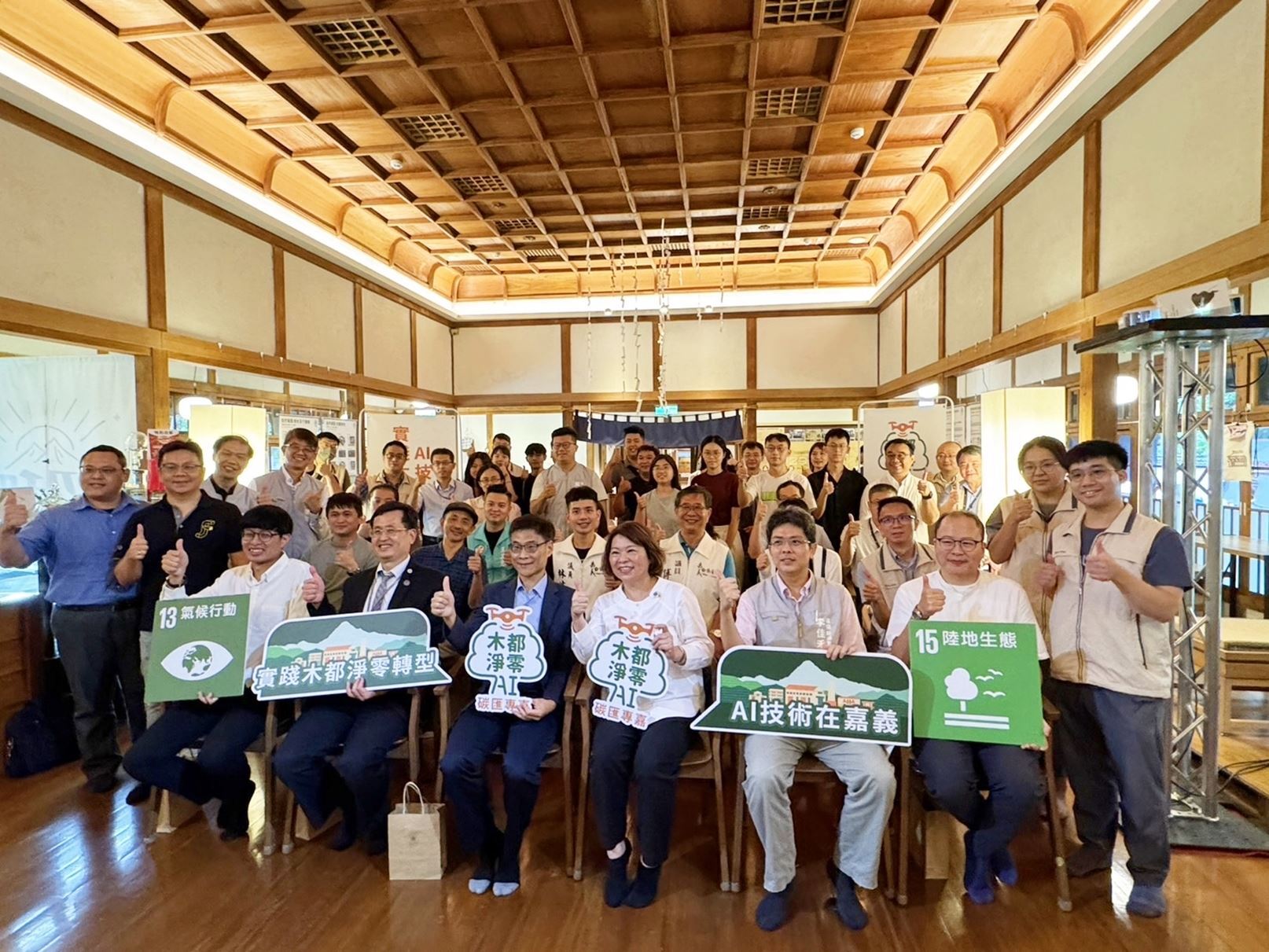
Group photo
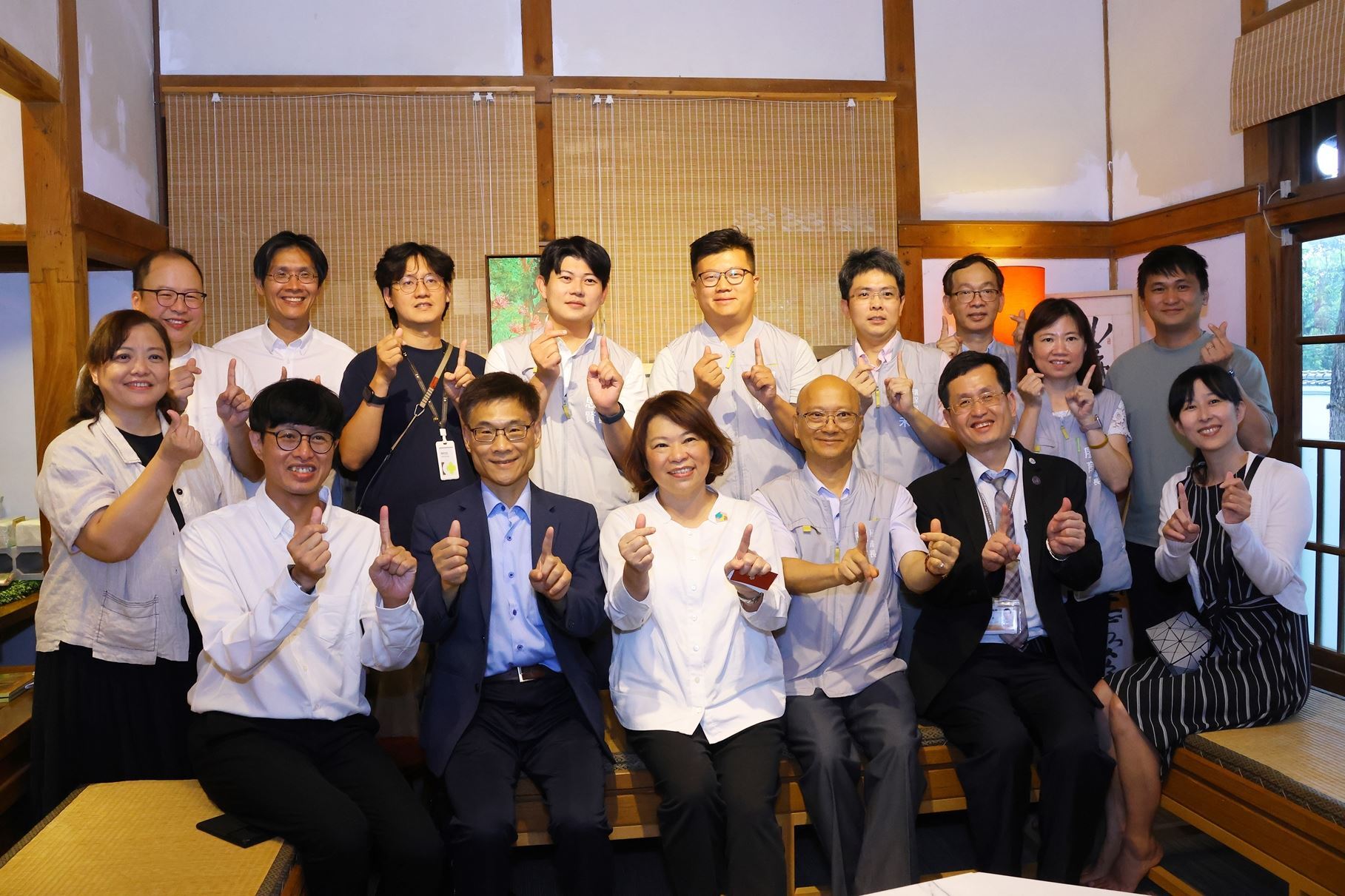
The mayor takes a group photo with the NCKU team.
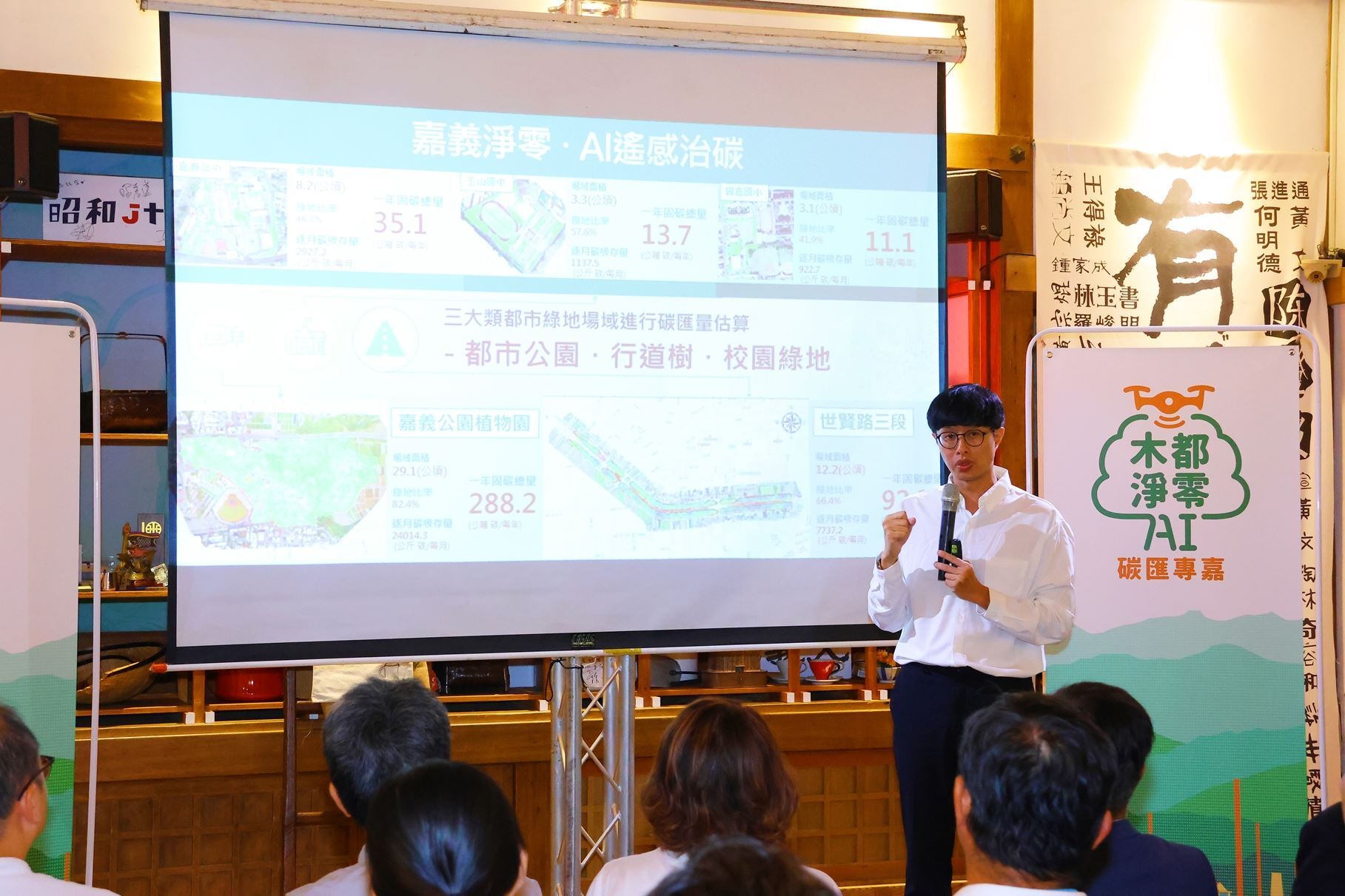
Professor Chih-Da Wu from NCKU gives a keynote speech on the carbon sequestration effectiveness of wooden buildings in Chiayi City.






